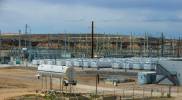All aboard the train to … Victorville?
People tend to laugh at the DesertXpress.
You know, the high-speed train project planned between Las Vegas and Victorville, Calif.
It’s that latter destination that causes the chuckles and inspires the jokes, since Victorville is the dictionary definition of the middle of nowhere. Other than a little mall, a Chili’s restaurant and a cargo airport operating on an old military airfield, there’s not much there.
So, naturally, we’d want to build a train there in the hopes that tourists from San Diego, Los Angeles and the Inland Empire — having crested the Cajon Pass with Barstow just over the horizon — would want to quit their cars and take a fast train to Sin City.
But while we’ve been laughing, the train’s backers — including Republican political consultant Sig Rogich and the Marnell Cos., which built a few hotels here in Las Vegas — have been steadily plugging away. Most recently, the federal Surface Transportation Board issued a finding that clears another hurdle for the DesertXpress.
"It’s a big deal," said Rogich.
The $6.5 billion train will be paid for with $1.5 billion in private money, and a $5 billion loan from the (take a deep breath) Federal Railroad Administration’s Railroad Rehabilitation and Improvement Financing Program. According to a study, fares from the 6.49 million round trips will cover both the operations and financing costs, while creating more than 88,000 jobs in Clark and San Bernardino counties.
In a town that’s heard its fair share of tall tales before (think the pathetically bankrupt Las Vegas Monorail, which never even came close to promised ridership numbers), the tendency toward skepticism is understandable. That many people will really park and ride from Victorville? Las Vegas residents will really ride to Victorville, and then rent a car for the rest of the journey into L.A.?
That’s where the California intrastate high-speed rail system comes in — maybe.
We learned Tuesday that the Golden State has pegged the cost of its 800-mile system that will run between Sacramento and San Francisco in the north to Los Angeles, Anaheim and San Diego in the south at $98.5 billion. That’s well more than an initial estimate of $43 billion that induced voters to pass a bond initiative for the project in 2008.
Why should Nevadans care about a California train line 300 miles away? Because one of those train stations is planned for Palmdale, Calif., a tantalizing 47 miles away from Victorville. And the backers of the DesertXpress — while insisting that the Victorville destination stands on its own — maintain their train will eventually link up with California’s system.
But that fond hope rests on a number of assumptions. First, you have to assume the California system will eventually be built, which is still in doubt because of the cost. (Several other states have rejected rail projects on that basis.) Second, you have to assume the Palmdale line will be constructed and that funding won’t run out. (The geniuses in California want to start with a "spine" running between the Central Valley cities of Bakersfield and Fresno, and branching out from there. If money dries up, critics warn it could be a train to nowhere.)
And third, you have to assume that somebody — either California, the federal government or maybe the backers of the DesertXpress themselves — will find a way to pay for the, ahem, missing link between Palmdale and Victorville. (That link hasn’t been formally approved.)
That’s a lot of assumptions. But even without the guarantees, DesertXpress backers are forging ahead (next up, a report evaluating the train’s federal loan application). We joke about Victorville, but in the end, this may be the little engine that did.
Steve Sebelius is a Review-Journal political columnist and author of the blog SlashPolitics.com. Follow him on Twitter at www.Twitter.com/SteveSebelius or reach him at 387-5276 or SSebelius@reviewjournal.com.


















